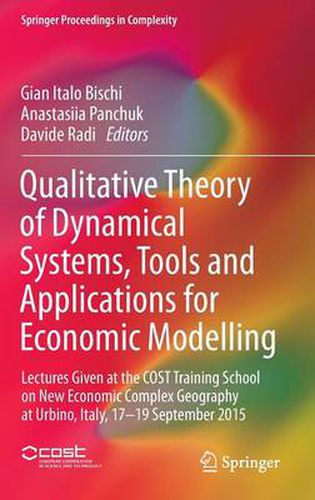Readings Newsletter
Become a Readings Member to make your shopping experience even easier.
Sign in or sign up for free!
You’re not far away from qualifying for FREE standard shipping within Australia
You’ve qualified for FREE standard shipping within Australia
The cart is loading…






This title is printed to order. This book may have been self-published. If so, we cannot guarantee the quality of the content. In the main most books will have gone through the editing process however some may not. We therefore suggest that you be aware of this before ordering this book. If in doubt check either the author or publisher’s details as we are unable to accept any returns unless they are faulty. Please contact us if you have any questions.
The book presents the lectures delivered during a short course held at Urbino University in summer 2015 on qualitative theory of dynamical systems, included in the activities of the COST Action IS1104 The EU in the new economic complex geography: models, tools and policy evaluation . It provides a basic introduction to dynamical systems and optimal control both in continuous and discrete time, as well as some numerical methods and applications in economic modelling.
Economic and social systems are intrinsically dynamic, characterized by interdependence, nonlinearity and complexity, and these features can only be approached using a qualitative analysis based on the study of invariant sets (equilibrium points, limit cycles and more complex attractors, together with the boundaries of their basins of attraction), which requires a trade-off between analytical, geometrical and numerical methods. Even though the early steps of the qualitative theory of dynamical systems have been in continuous time models, in economic and social modelling discrete time is often used to describe event-driven (often decision-driven) evolving systems.
The book is written for Ph.D. and master’s students, post-doctoral fellows, and researchers in economics or sociology, and it only assumes a basic knowledge of calculus. However it also suggests some more advanced topics.
$9.00 standard shipping within Australia
FREE standard shipping within Australia for orders over $100.00
Express & International shipping calculated at checkout
This title is printed to order. This book may have been self-published. If so, we cannot guarantee the quality of the content. In the main most books will have gone through the editing process however some may not. We therefore suggest that you be aware of this before ordering this book. If in doubt check either the author or publisher’s details as we are unable to accept any returns unless they are faulty. Please contact us if you have any questions.
The book presents the lectures delivered during a short course held at Urbino University in summer 2015 on qualitative theory of dynamical systems, included in the activities of the COST Action IS1104 The EU in the new economic complex geography: models, tools and policy evaluation . It provides a basic introduction to dynamical systems and optimal control both in continuous and discrete time, as well as some numerical methods and applications in economic modelling.
Economic and social systems are intrinsically dynamic, characterized by interdependence, nonlinearity and complexity, and these features can only be approached using a qualitative analysis based on the study of invariant sets (equilibrium points, limit cycles and more complex attractors, together with the boundaries of their basins of attraction), which requires a trade-off between analytical, geometrical and numerical methods. Even though the early steps of the qualitative theory of dynamical systems have been in continuous time models, in economic and social modelling discrete time is often used to describe event-driven (often decision-driven) evolving systems.
The book is written for Ph.D. and master’s students, post-doctoral fellows, and researchers in economics or sociology, and it only assumes a basic knowledge of calculus. However it also suggests some more advanced topics.